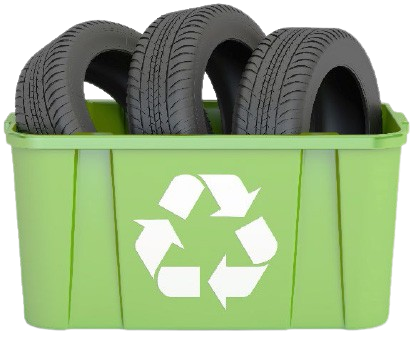Municipal Scrap Tire Collector
Transforming Scrap Tires into Sustainable Solutions for Municipalities in all Florida!
Collaborating With All Municipal Landfills Across The State Of Florida.
With our Municipal Scrap Tire Collector, we tailor processing services to suit the distinct requirements of local governments. This includes offering storage facilities or deploying specialized railcars at designated landfills to facilitate tire management. Our commitment to municipalities lies at the core of our environmental vision, addressing the pressing issue of tire waste in Florida and beyond.
Moreover, we employ volume-reducing machinery operated by skilled personnel to ensure efficient tire processing based on each municipality’s waste output. By providing these bespoke solutions, we aim to establish ourselves as the go-to partner for municipalities seeking sustainable waste management strategies.
Central Florida Recycled Used Tire Drop-Off
Recycling tires play a crucial role in diverting discarded tires away from landfills, contributing significantly to environmental preservation. In modern times, recycled tires find application across various industries, showcasing the versatility of proper tire management. At the Florida Tire Recycling Plant, we accept tires of all sizes including OTR, imposing a minimum fee based on tire size. There are no restrictions on the quantity of tires we receive, offering flexibility to our clients. We are a Municipal Scrap Tire Collector in Florida. We will begin opening to the public in summer 2025
Environmental Issues
Part of the environmental issues are: Visually unappealing, they cause pollution, threaten the public’s health, and are dangerous fire hazards.
A large part of the used tires are stored inappropriately and this poses very serious environmental, economic, and health consequences.
Tires contain a variety of chemicals and toxic compounds which can be released by mishandling or over time if left outdoors. These compounds, such as oils, heavy metals and organic substances, can leach into the soil and groundwater. or superficial when they decompose.

Landfills Problems
Space Consumption: Tires are bulky and take up a lot of space in landfills, reducing the available capacity for other waste disposal.
Fire Hazards: When tires are improperly disposed of, they can catch fire easily and burn for long periods due to their high fuel content. Tire fires release toxic smoke and gases into the air, posing health risks and environmental hazards.
Environmental Pollution: Tires can leach toxic chemicals into the soil and water, contaminating the surrounding environment. The chemicals released from decomposing tires can pollute groundwater and surface water sources.
Vector Breeding Grounds: Tire piles can collect rainwater, creating stagnant pools that serve as breeding grounds for disease-carrying mosquitoes and other pests, increasing the risk of vector-borne diseases.
Aesthetics: Large tire piles are unsightly and can detract from the visual appeal of an area, impacting property values and community aesthetics.
Longevity: Tires degrade very slowly in landfills, taking hundreds to thousands of years to decompose fully. This long lifespan exacerbates the space and environmental issues associated with tire disposal.

WE HAVE A TRUE COMMITMENT TO INTEGRITY
WITH THE ENVIRONMENT
Municipal Scrap Tire Collector Service Area
Coconut Creek
Cooper City
Coral Springs
Dania Beach
Davie
Deerfield Beach
Fort Lauderdale
Hallandale
Hillsboro Beach
Hollywood
Lauderdale Lakes
Lauderdale-by-the-Sea
Lauderhill
Lazy Lake
Lighthouse Point
Margate
Miramar
North Lauderdale
Oakland Park
Parkland
Pembroke Park
Pembroke Pines
Plantation
Pompano Beach
Sea Ranch Lakes
Sunrise
Tamarac
Weston
Wilton Manors
Broward County
Atlantis
Belle Glade
Boca Raton
Boynton Beach
Briny Breezes
Cloud Lake
Delray Beach
Glen Ridge
Golf
Greenacres
Gulf Stream
Haverhill
Highland Beach
Hupoluxo
Juno Beach
Jupiter
Jupiter Inlet Colony
Lake Clarke Shores
Lake Park
Lake Worth
Lantana
Loxahatchee Groves
Manalapan
Mangonia Park
North Palm Beach
Ocean Ridge
Pahokee
Palm Springs
Riviera Beach
Royal Palm Beach
South Bay
Tequesta
Wellington
West Palm Beach
Giving Tires a NEW LIFE...
Municipal Scrap Tire Solutions, Processing
up to 99.99% of the Tire Components.
- Youtube
